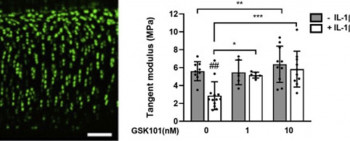News
New paper on anti-inflammatory effects of TRPV4 stimulation
11 January 2021

Prof Knight's research group have published a new study showing, for the first time, the anti-inflammatory effects of stimulating the mechanosensitive ion-channel, TRPV4, and its importance in cartilage health.
Degenerative joint conditions, such as osteoarthritis, are associated with pro-inflammatory signalling which causes degradation of the articular cartilage leading to stiff and painful joints.
This research study revealed that activation of TRPV4 by mechanical loading, or associated osmotic challenge, prevented pro-inflammatory signalling in articular cartilage cells caused by the cytokine interleukin 1B (IL-1B). Furthermore, treatment of cartilage tissue with the TRPV4 agonist, GSK101, also prevented pro-inflammatory signalling and blocked the associated degradation of the cartilage extracellular matrix and loss of biomechanical properties. The study examined the underlying mechanisms involving post-translational tubulin modifications and regulation of primary cilia length.
This study reveals, the potential of TRPV4 manipulation as a novel therapeutic mechanism to suppress pro-inflammatory signalling and cartilage degradation as a potential pharmaceutical treatment for degenerative joint disease.
The paper published in the journal Osteoarthritis and Cartilage. It was based on the work of Dr Su Fu, a PhD student supervised by Prof Martin Knight, with support from Dr Clare Thompson and others within the Knight research group based in bioengineering at QMUL.
| Contact: | Prof Martin Knight |
| Email: | m.m.knight@qmul.ac.uk |
| Website: | |
| People: | Martin KNIGHT Himadri GUPTA Wen WANG |
| Research Centre: | Bioengineering |
Updated by: Martin Knight




